

Would you sacrifice one person to save five? - Eleanor Nelsen. For Phillippa Foot’s original version of the trolley problem, in which the main character is driving the runaway trolley rather than standing beside the tracks, see this 1967 paper.
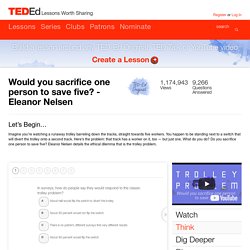
This interactive lets you decide how you would respond to the classic problem and three variants, and compares your answers to those of participants in a Harvard study. What Do Buddhist Monks Think of the Trolley Problem? - The Atlantic. The Harvard psychologist Joshua Greene is an expert in “trolleyology,” the self-effacing way he describes his research into the manifold variations on the trolley problem.
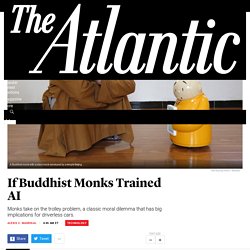
The basic form of this problem is simple: There’s a trolley barreling towards five people, who will die if they’re hit. But you could switch the trolley onto another track on which only a single person stands. Should you do it? From this simple test of moral intuition, researchers like Greene have created an endless set of variations. Moral Machine. Why It’s So Hard to Train Someone to Make an Ethical Decision.
One of the conundrums of ethical decision making is that many moral decisions that are quite straightforward — even easy — to resolve in a classroom or during training exercises seem far more difficult to successfully resolve when confronted during actual day-to-day decision making.
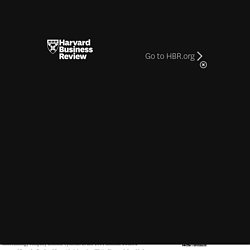
Take the decision of Sam Waksal, the former CEO of the emerging biotechnology company ImClone Systems. In late 2001 ImClone awaited approval from the Food and Drug Administration (FDA) of its much-heralded new cancer treatment, but unexpectedly the FDA decided to reject the company’s application. After privately learning of the FDA’s decision, Waksal called his daughter and told her to sell her ImClone shares before the news became public and the stock plummeted. To any outside observer, Waksal’s decision was incredibly shortsighted and unreflective.
This was precisely the kind of insider trading that regulators routinely monitored, a fact that Waksal was not oblivious to. Introduction to Ethics – ToK Trump. This lesson is for DP1 students in the first term of their ToK Course, the lesson was actually written and delivered by a couple of my DP1 students to the other students in the class.

The students have been reading (for leisure) the book Inferno by Dan Brown (brief plot synopsis here.) Put students into groups of 3-4, and ask them to discuss & decide the following ethical dilemma: Option 1: You take no action, and allow the release of a virus which kills 50% of people, thus reducing population growth to a sustainable level. 1900s Posters Warning Men About The Dangers Of Women's Rights. Early 1900s Posters Warning Men About The Dangers Of Women’s Rights These early 1900s propaganda posters warning men about the dangers of women’s rights are extremely absurd but all the more funny in modern day times.

Considering the politically correct period we’re living in today, such posters would be completely unimaginable these days. Well, at least not without a severe lawsuit. Throughout history, women had to fight for every right they have today. The Drawbridge Exercise. Utilitarianism: The Greatest Good for the Greatest Number. Ethics, dilemmas and thought experiments. The trolley and the psychopath. Stop me if you’ve heard this one.
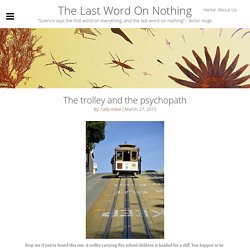
A trolley carrying five school children is headed for a cliff. You happen to be standing at the switch, and you could save their lives by diverting the trolley to another track. But there he is – an innocent fat man, picking daisies on that second track, oblivious to the rolling thunder (potentially) hurtling his way. Divert the trolley, and you save the kids and kill a person. Do nothing, and you have killed no one but five children are dead. This kind of thought experiment is known as a sacrificial dilemma, and it’s useful for teaching college freshmen about moral philosophy.
Kahane, deputy director of Oxford’s Uehiro Centre for Practical Ethics, has never been a big fan of the sacrificial dilemma. Phil osophically, the sacrificial dilemma has a narrow purpose. So what do philosophers mean by utilitarianism? That’s a demanding moral framework! The results, published in January in the journal Cognition, were not encouraging. Image credits. Postprandial Reflections: Calvin and Hobbes on Ethics. Ethical Decision Making. Some Moral Dilemmas. The Trolley Problem, not in Grassian.
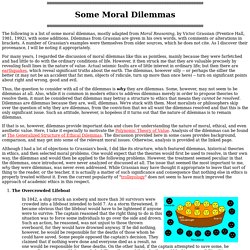
Suggested by Philippa Foot (1920-2010), daughter of Esther, the daughter of President Grover Cleveland, but of British birth because of her father, William Sidney Bence Bosanquet. A trolley is running out of control down a track. In its path are five people who have been tied to the track by a mad philosopher. Fortunately, you could flip a switch, which will lead the trolley down a different track to safety.
Unfortunately, there is a single person tied to that track. This is a classic "right vs. good" dilemma. Deaf Belgian twins going blind choose to be euthanized. Distraught about going blind, 45-year-old deaf twin brothers from Belgium chose to be euthanized because they couldn't bear not to see one another, according to reports from Flanders.
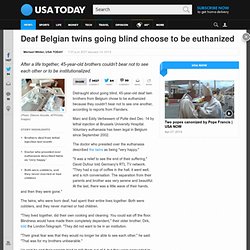
Marc and Eddy Verbessem of Putte died Dec. 14 by lethal injection at Brussels University Hospital. Voluntary euthanasia has been legal in Belgium since September 2002.